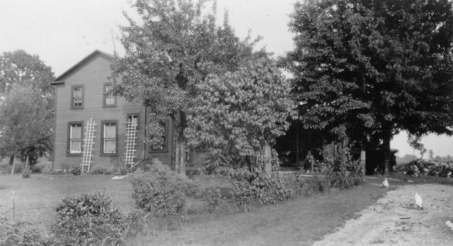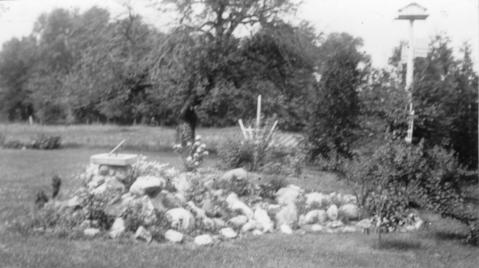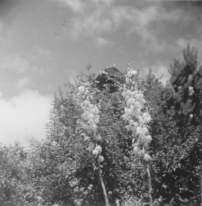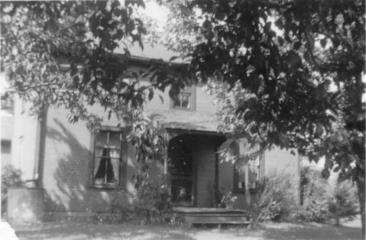 Well, I was neither born in some sort of a mansion nor a tarpaper shack. I was,
however, born in a simple, modest, wood frame house. It was economically functional and
devoid of all frills. Although it is usual to enter one's house through a front door into
a front hall or vestibule, our front door, which was never locked, opened directly into
the living-dining area. Visitors left their wraps on the bed in whichever was the spare
bedroom at the time. The livingroom served also as a diningroom on Sundays and whenever we
were entertaining guests. The floor was carpeted with a wall-to-wall, loom-woven, rag
carpet fastened down with carpet-tacks. Several comfortable rocking chairs beckoned
hospitably.
Well, I was neither born in some sort of a mansion nor a tarpaper shack. I was,
however, born in a simple, modest, wood frame house. It was economically functional and
devoid of all frills. Although it is usual to enter one's house through a front door into
a front hall or vestibule, our front door, which was never locked, opened directly into
the living-dining area. Visitors left their wraps on the bed in whichever was the spare
bedroom at the time. The livingroom served also as a diningroom on Sundays and whenever we
were entertaining guests. The floor was carpeted with a wall-to-wall, loom-woven, rag
carpet fastened down with carpet-tacks. Several comfortable rocking chairs beckoned
hospitably.
From this area, we had access to the upstairs and four bedrooms; or by going straight
ahead we entered the parlour and two other bedrooms. Our parlour had a separate door,
which was always kept closed, except when the folks were entertaining. Naturally, in the
winter months, this room would always be quite cool. One of these two bedrooms was used by
Grandma and Aunty. The other one, which opened off the parlour was a spare, or guest,
room.
Of the four bedrooms upstairs, the largest one, which was over the livingroom, was Ma's
and Pa's room, where I first greeted the June world. The other three rooms were where us
boys and our sister slept. I remember the floor in this master bedroom was always a bit
shaky and squeeky. I expect that the builders skimped on the construction, using the wrong
size joists. There were two redeeming features -- two large walk-in clothes closets under
the eaves. The other three rooms did well to have a small closet each.
Farther along the hall was a fourth room which became the bedroom for our little sister
as soon as she was able and willing to leave her crib in Ma's room. This room, however
small, served her purpose until she eventually left home to share her life with another.
 Besides
the usual bed and bureau, each bedroom was supplied with the latest in Toiletware -- a
wash stand, complete with china wash bowl and two water pitchers and soap dish. Besides,
there was a towel bar and in the cupboard underneath was stored a covered china Chamber
Pot or Chimmy.
Besides
the usual bed and bureau, each bedroom was supplied with the latest in Toiletware -- a
wash stand, complete with china wash bowl and two water pitchers and soap dish. Besides,
there was a towel bar and in the cupboard underneath was stored a covered china Chamber
Pot or Chimmy.
When we were four Barefoot boys, we had to sleep all four in one bed -- feet to feet.
When we grew too tall for this arrangement, a second bedroom became available. My two
older brothers were then assigned the larger room across the hall, with a west view. Louis
and I then accepted the east bedroom. This room was smaller but had a sunrise view.
However, in the winter time, when a damp, east wind blew, well that wind found every
possible opening.
I remember that our bed had a straw mattress over a woven spring support. On top of
this was a feather ticking. It was necessary to replace the straw every year or so, making
sure that there were no thistles or barley beards. The feather ticking was filled with
clean goose down, which we saved whenever a goose was killed.
 Downstairs, of
course, was the farm kitchen. This is the addition that Ma persuaded Pa to build shortly
after they were married. Here is where all our meals were prepared and eaten during the
week. Special occasions and on most Sundays, dinners were served in the diningroom. Ma did
all of her cooking and baking on the old-fashioned iron range, complete with warming oven
and water heating reservoir. The reservoir was usually used for heating rain-water from
either the cistern or a rain barrel. A copper water kettle was used to heat all water for
cooking or beverage. This kettle was usually kept on the hot stove ready for use. The iron
pump at the well by the front door supplied the drinking water. It was necessary to keep a
bucket of fresh water from this well, always handy on the kitchen sink. A long handle tin
dipper served as the supply line from the bucket to where used and from the reservoir to
dishpan or wash basin. When we were available, it used to be our job to keep the water
bucket filled.
Downstairs, of
course, was the farm kitchen. This is the addition that Ma persuaded Pa to build shortly
after they were married. Here is where all our meals were prepared and eaten during the
week. Special occasions and on most Sundays, dinners were served in the diningroom. Ma did
all of her cooking and baking on the old-fashioned iron range, complete with warming oven
and water heating reservoir. The reservoir was usually used for heating rain-water from
either the cistern or a rain barrel. A copper water kettle was used to heat all water for
cooking or beverage. This kettle was usually kept on the hot stove ready for use. The iron
pump at the well by the front door supplied the drinking water. It was necessary to keep a
bucket of fresh water from this well, always handy on the kitchen sink. A long handle tin
dipper served as the supply line from the bucket to where used and from the reservoir to
dishpan or wash basin. When we were available, it used to be our job to keep the water
bucket filled.
According to the standards of that day, I guess we were pretty well fixed. But as time
went by, Ma became dissatisfied with this primitive equipment she had to use.
 Well, I was neither born in some sort of a mansion nor a tarpaper shack. I was,
however, born in a simple, modest, wood frame house. It was economically functional and
devoid of all frills. Although it is usual to enter one's house through a front door into
a front hall or vestibule, our front door, which was never locked, opened directly into
the living-dining area. Visitors left their wraps on the bed in whichever was the spare
bedroom at the time. The livingroom served also as a diningroom on Sundays and whenever we
were entertaining guests. The floor was carpeted with a wall-to-wall, loom-woven, rag
carpet fastened down with carpet-tacks. Several comfortable rocking chairs beckoned
hospitably.
Well, I was neither born in some sort of a mansion nor a tarpaper shack. I was,
however, born in a simple, modest, wood frame house. It was economically functional and
devoid of all frills. Although it is usual to enter one's house through a front door into
a front hall or vestibule, our front door, which was never locked, opened directly into
the living-dining area. Visitors left their wraps on the bed in whichever was the spare
bedroom at the time. The livingroom served also as a diningroom on Sundays and whenever we
were entertaining guests. The floor was carpeted with a wall-to-wall, loom-woven, rag
carpet fastened down with carpet-tacks. Several comfortable rocking chairs beckoned
hospitably.

 Besides
the usual bed and bureau, each bedroom was supplied with the latest in Toiletware -- a
wash stand, complete with china wash bowl and two water pitchers and soap dish. Besides,
there was a towel bar and in the cupboard underneath was stored a covered china Chamber
Pot or Chimmy.
Besides
the usual bed and bureau, each bedroom was supplied with the latest in Toiletware -- a
wash stand, complete with china wash bowl and two water pitchers and soap dish. Besides,
there was a towel bar and in the cupboard underneath was stored a covered china Chamber
Pot or Chimmy. Downstairs, of
course, was the farm kitchen. This is the addition that Ma persuaded Pa to build shortly
after they were married. Here is where all our meals were prepared and eaten during the
week. Special occasions and on most Sundays, dinners were served in the diningroom. Ma did
all of her cooking and baking on the old-fashioned iron range, complete with warming oven
and water heating reservoir. The reservoir was usually used for heating rain-water from
either the cistern or a rain barrel. A copper water kettle was used to heat all water for
cooking or beverage. This kettle was usually kept on the hot stove ready for use. The iron
pump at the well by the front door supplied the drinking water. It was necessary to keep a
bucket of fresh water from this well, always handy on the kitchen sink. A long handle tin
dipper served as the supply line from the bucket to where used and from the reservoir to
dishpan or wash basin. When we were available, it used to be our job to keep the water
bucket filled.
Downstairs, of
course, was the farm kitchen. This is the addition that Ma persuaded Pa to build shortly
after they were married. Here is where all our meals were prepared and eaten during the
week. Special occasions and on most Sundays, dinners were served in the diningroom. Ma did
all of her cooking and baking on the old-fashioned iron range, complete with warming oven
and water heating reservoir. The reservoir was usually used for heating rain-water from
either the cistern or a rain barrel. A copper water kettle was used to heat all water for
cooking or beverage. This kettle was usually kept on the hot stove ready for use. The iron
pump at the well by the front door supplied the drinking water. It was necessary to keep a
bucket of fresh water from this well, always handy on the kitchen sink. A long handle tin
dipper served as the supply line from the bucket to where used and from the reservoir to
dishpan or wash basin. When we were available, it used to be our job to keep the water
bucket filled.